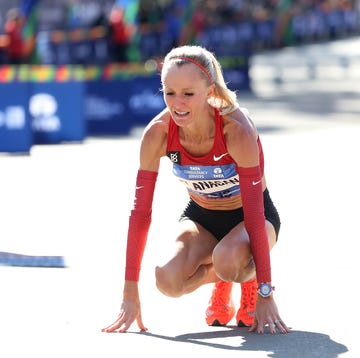Once a week, early in the morning, Maryann Gong straps on a backpack and runs a mile and a half to the Trader Joe’s in Cambridge, Massachusetts. The Massachusetts Institute of Technology (MIT) junior fills her bag with groceries, conscious of not making it too heavy for her run back. She usually makes two three-mile trips before her 10 a.m. engineering class.
An academic burden far heavier rests on Gong’s shoulders: She’s double majoring in electrical engineering and computer science at one of the country’s toughest institutions. Despite these demands, she was the NCAA Division III 3,000-meter champion and third in the mile last winter during the indoor season.
Gong’s life is a balancing act between high-level running and endless work for classes. “There’s no real stopping point [with studying],” Gong says of her coursework. “You have to have a goal. ‘I want to study X by this amount of time.’ That way, your workload is defined, and you’re more motivated to hit the mark.”
Gong and others in college have mastered the art of time management—and their tips are useful for anyone trying to balance serious training and a life overflowing with commitments.
Strict Bedtimes
College runners know they need to make sleep a priority, but it’s a time crunch to finish schoolwork and hit the sack at a reasonable hour. Keeping an eye on the clock has been crucial for Courtney Frerichs, recent University of Missouri-Kansas City graduate and runner-up in the 2015 NCAA 3,000-meter steeplechase. “We have workouts every morning at 6 a.m., so I know that I have a 10 p.m. deadline each night to finish my work,” says Frerichs, who double majored in chemistry and psychology.
Tip: Treat sleep like an assignment—put in enough to get the job done.
Get Support
Classes can conflict with practice time, putting athletes’ priorities to the test. Sometimes runners must squeeze workouts in early in the morning or during schedule gaps, and if they’re smart, they figure out a way to have a coach or teammate by their side. Tabor Stevens, a three-time NCAA Division II steeplechase champion while he was at Adams State University, remembers an entire cross-country season when he had to miss practice due to a class conflict. But he made sure his coach was on board—and present when necessary to assist Stevens. “I needed the class to finish my geography major,” Stevens says. “So I met my coach early in the morning to do workouts. And yes, running an eight-mile tempo alone on a track is just as fun as it sounds.”
Tip: Be upfront about schedule conflicts, and see who’s around to help if you have to run a workout at an odd hour.
Limit Screen Time
When she’s studying, Erin Finn, a University of Michigan junior and two-time All-American in the 5,000 meters, keeps social media tabs off. For a break from a long block of studying, instead of binging on Twitter or Facebook, she steps away from the computer. “I try to reward myself with a five-minute walk or talk break [with a friend],” the biochemistry major says. “I think this stimulates my brain in a different way.”
Tip: Social media can be a black hole for even the most disciplined worker. Build in breaks that refresh you so you can focus for another stretch.
Manage Energy Levels
Finn knows her best studying time is before practice, because she’s tired and hungry when her workout is over. “I try to get a good meal and get to bed relatively early,” she says. “This allows me to zoom through work much faster in the morning.”
Tip: Figure out when you’re at your best and schedule your hardest school tasks—and workouts—for those time periods.
Take a Break
With tight schedules and deadlines, college runners learn the importance of penciling in free time. For Haley Meier, who just finished her sophomore year at Duke University and is transferring to the University of Michigan, the trick is taking a full day off from work each week. She regularly studies on Friday nights but tries to give herself Saturdays off. “I know my legs need to rest once a week, and so does my brain,” Meier says.
Tip: Schedule time when you can tune out. Rest is an important part of a training schedule, and it’s an important part of a work schedule, too.
Strategic Sacrifices
Running doesn’t always come first. Second Lt. Rebecca Esselstein of the Air Force Academy underwent a rigorous application process for the Rhodes Scholarship in the fall of 2014, her senior year. The week before cross-country regionals, she got a call to interview in Chicago—the day before the race went off in Albuquerque. “My friend drove me to the airport at 4:30 a.m., and the interview was at five that night,” Esselstein says. “Then I hopped on a plane and landed in New Mexico around 11 p.m. I didn’t get to do any sort of pre-meet run; at that point I was just running on adrenaline.” Shocker: The race didn’t go as well as she wanted. But in November, Esselstein was awarded the Rhodes and now she’s studying astrophysics at Oxford University.
Tip: When faced with a packed day, ask yourself this question: What’s the most important thing that has to happen today? It might be a workout. It might be work. Prioritize accordingly.
Timeless Wisdom
Foods That Cut Inflammation to Improve Performance.
Plan Ahead
“The Sunday after syllabus week, I’ll sit down and mark all of the due dates into my calendar, starting with exams and ending with daily assignments for the entire semester.”
—Rebecca Esselstein, Air Force ’15
Other Hearst Subscriptions
“When I study, I have to be completely free from distractions. I’ll try to find a dark, isolated corner of the library where I can study.”
—Emma Fisher, Stanford ’17
Published: Dec 09, 2015 5:30 PM EST
“Though track has its own pressure, running itself relaxes me. It gives me a window of time that I’m not allowed to think about school or work or anything else.”
—Maryann Gong, MIT ’17
Foods That Cut Inflammation to Improve Performance
“I had a teammate who’s now in medical school, and he always spread out his MCAT books and study guides at our track meets, right next to the Gatorade coolers. He snapped me into focus. It’s 100 percent doable to get a 4.0 GPA while running at the collegiate level.”
—Martin Hehir, Syracuse ’15

Races - Places Running Times, Let Your Mind Run Runner's World and Bicycling magazines.













